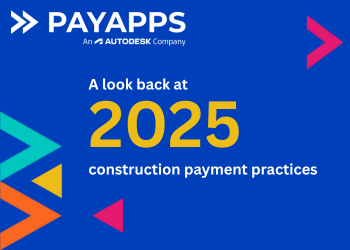Construction industry payment practices
Payment practices within the construction industry have long been a contentious issue. With late or delayed payments the expected norm, and disputes or reduced payments, due to often spurious claims, exceedingly common, it is a thorny issue for many within the sector.
Historically, large companies have been particularly guilty of being slow to pay their contractors, with the knock-on effect down the supply chain resulting in the SMEs at the bottom of the pyramid often being the worst affected.

Measures to stamp out late payment in construction
The Government and various industry bodies have stepped in to introduce measures and guidelines to try to stamp out any underhand practices but is the industry actually seeing any improvements or, when it comes to payments, are matters as bad as they have always been?
After the collapse of Carillion back in 2018, the impact of poor payment practices was thrust into the limelight. The Government responded by toughening up its Prompt Payment Code. The voluntary initiative had been introduced to champion good practice within the industry, but although many big players happily signed up to the code, as the collapse of Carillion exposed, these companies were not necessarily adhering to the principles of it.
The Government declared that this would no longer be acceptable and they would start naming and shaming companies who did not pay at least 95% of their invoices within 60 days and would publicly suspend them from the code. The fact that a number of the UK’s largest contractors have at one time or another been suspended from the code over the last couple of years for failing to meet this requirement, is indicative of how ingrained the practice of late payment has become with the sector.
How has Covid impacted construction payments?
The onset of the Covid pandemic last year rocked the industry, and many feared payment times would become worse. However, data collated by Build UK suggests that this wasn’t the case. In the last half of 2020, the main contractors in the UK improved their payment times, with the leading 32 contractors paying their subcontractors within 35 days on average.
This data, though, still has some question marks over it as the payment data factors in all supplier payments, not just those made to contractors. For example, you might be timely payers for your coffee in your canteen, but not necessarily for your contractors.
On the other side of the coin, a survey from Construction News found that the majority of respondents do not feel payment practices have improved, and a significant percentage feel they have got worse. The survey found that 72% of businesses claim to be waiting more than 40 days for their money, however, 74% also said they themselves take less than 40 days to pay their own suppliers. It is therefore difficult to obtain an accurate picture as the responses would appear to be contradictory.
Either the respondents are blinded by ‘negativity bias’, i.e. they remember the times they were paid late, but not the times they were paid earlier, or they themselves are not realising how often they are the late payers.
Digitisation of construction payments
This confusion is not helped by the notoriously poor record-keeping within the construction industry. Often, the cause of payments not being made on time is non-standard processes, resulting in applications and documentation being mislaid and deadlines being missed.
It is therefore very difficult for many businesses to make accurate claims on the time it has taken them to pay or get paid, as they just do not have the records to fall back on. Digitisation of the payment process can, and does, remove all of these obstacles.
Processes become standardised, documentation is collated and stored together, accessible to everyone, and a full audit trail is created, meaning companies can report accurately on the timelines for payment.
With a system like Payapps, designed to streamline the certification of applications for payment,timely reminders will also be created to ensure deadlines are not missed. The Construction News survey found that nearly half of their respondents felt they did not know enough about the options available to digitise their payment process.
We’re here to change that.




